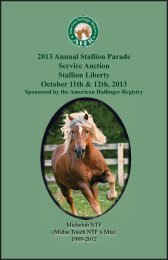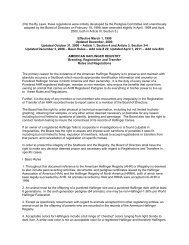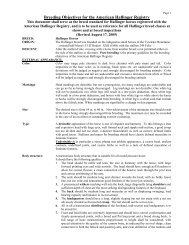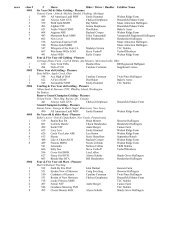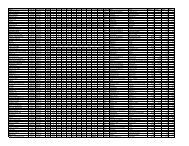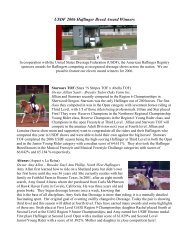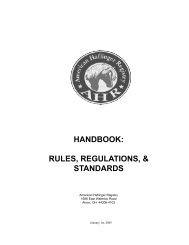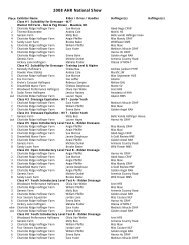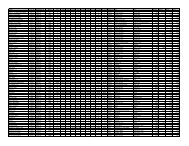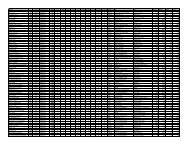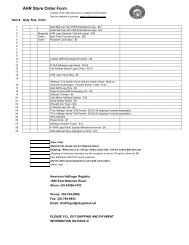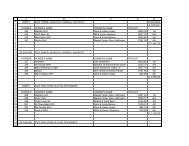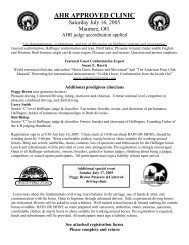handbook - American Haflinger Registry
handbook - American Haflinger Registry
handbook - American Haflinger Registry
Create successful ePaper yourself
Turn your PDF publications into a flip-book with our unique Google optimized e-Paper software.
a. Communicating with the announcer to insure that all eligible entries are assembled before thejudging begins.b. Relieve the Judge of unnecessary details: assemble the class promptly, keep the judgingprogram on schedule, eliminate long delays between classes and helps control the conduct ofthe horses and exhibitors in the ring. The Ring Master has the authority to excuse entries fromany class if conditions warrant such action.c. Notify the Judge when all entries are present for each class.d. Assist the Judge, not advise him/her, and refrain from discussing, or seeming to discuss, thehorses or exhibitors in the ring.e. Have charge of activities of the ring or arena.f. Assure that all the Judge’s directives are communicated and followed.5. JUDGES and JUDGING: Judges are nominated from the Draft and Pleasure show committees. A contract willbe drawn up and signed by both parties after a comprehensive appraisal of the Judge’s areas of expertise. TheJudge shall not be an exhibitor, driver, technical delegate or manager at any show at which they are officiating.The Judge shall not officiate at any show in which a member of his immediate family, clients, or trainers iscompeting. A <strong>Haflinger</strong> may not be shown in front of a judge that is owned by or sold by said judge within aperiod of ninety days prior to the event or currently leased from said judge. The judge must be clear and freefrom all <strong>Haflinger</strong>s in the show, including boarding and training of the <strong>Haflinger</strong>, owner or exhibitor. Thejudge must maintain clean hands as to distance himself/herself from exhibitors.I. CONDUCT OF SHOWSa. In any class, the Judge is the absolute authority. Once a class has been judged, it shall not bere-judged. Once the Judge has marked his/her card and places for awards are made, there shallbe no changing of the Judge’s record.b. The Judge may order any person or horse from the competition for poor conduct of either andmay disqualify any competitor for excessive abuse of the horse. The Judge may at his/herdiscretion refuse entry into the arena or remove an entry from a class for improper attire and/orequipment or for improper actions, which may include being under the influence of alcohol ordrugs.c. During the class, excessive use of the voice, shouting, whipping or whistling to the horse maybe penalized at the Judge’s discretion. In any driving class, the driver should strive to controlthe horse’s movement with discreet use of vocal aids.d. Any request to speak to a Judge during the show must be made through a Show Steward.When an exhibitor makes a request through a Show Steward for the Judge’s opinion concerningthat exhibitor’s horse, it is urged that the Judge will give his/her opinion courteously andsincerely in the presence of a Show Steward. A good rule of thumb would be to always askyour question in a non-blaming, non-threatening way and then be silent and listen. If you feelthe need to use words like ‘’but’’, ‘’if’’ and ‘’how about’’, then you are crossing the line. Justlisten and then thank the Judge for their time. A negative comment from your perception ofthe Judge’s ability should only be stated on the evaluation questionnaire.e. The Judge must always be treated with courtesy, cooperation and respect. No person,exhibitor, owner, parent, show official or otherwise, shall direct abuse, threatening conduct orintimidation toward the Judge or show committee, whether or not the conduct occurs duringthe show or on the show grounds. At the discretion of the show officials, a violation of thisrule may result in disciplinary action up to and including removal of the exhibitor or competitorfrom the competition, show grounds or future shows. If actions or threats are unlawful, theaffected should contact the appropriate legal authorities.f. No exhibitor will visit or socialize with the Judge the day prior to or the day of the show.There will be no fraternization between an exhibitor and the Judge during the show.g. To protest a Judge’s decision, a formal protest must be filed as described in these rules.A. ABUSE: Cruelty to or the abuse of a horse by any person at a show is forbidden and renders the offender subject to penalty.The Show Committee must act on any report of cruelty or abuse and if determined to be valid, the violator may be barredfrom further participation in that show or future shows.B. SOUNDNESS: The Judge shall watch for lameness in all horses brought into any class. Obvious lameness shall be causefor disqualification. Obvious lameness is:1. Consistently observable at a trot under all circumstances.7/08 VI-A-258



